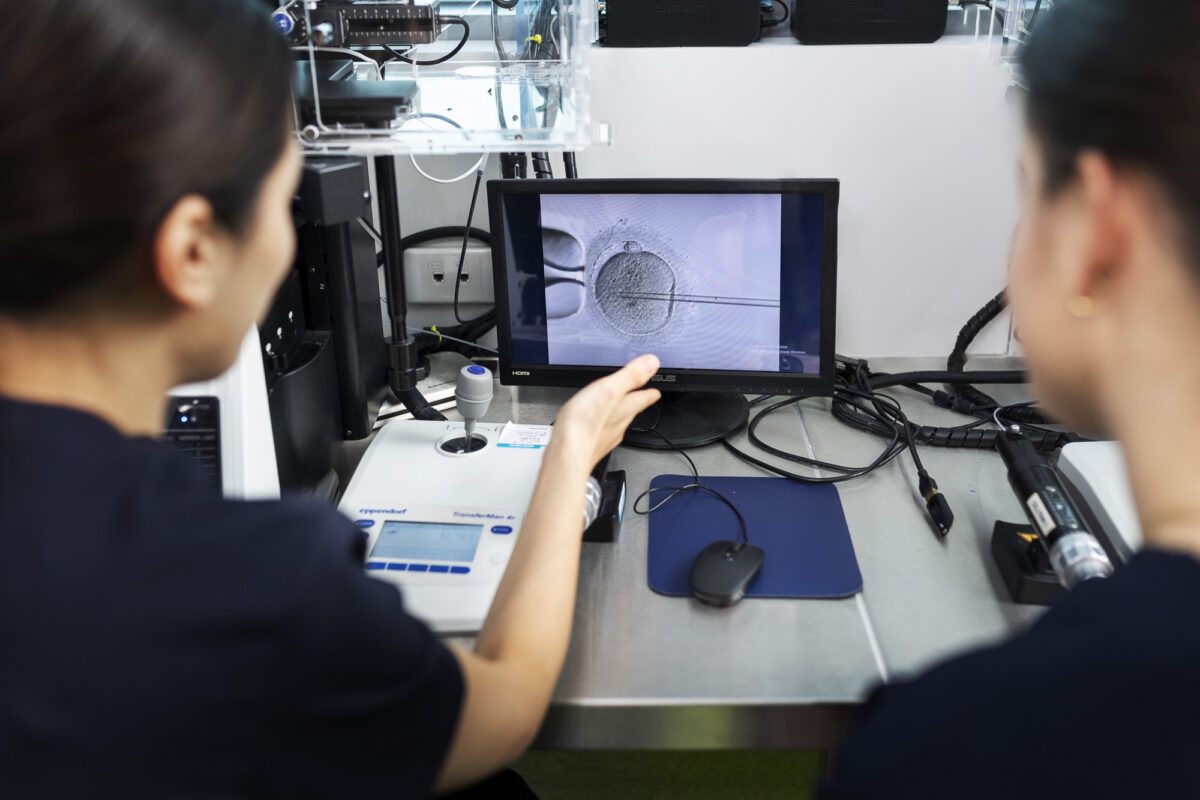What is IVF witnessing?
Witnessing in IVF refers to the process of confirming that the correct eggs, sperm and embryos are used for the correct patient at the correct time. It mitigates the risk of mismatched or misidentified samples. At Newlife IVF, we take this responsibility extremely seriously, which is why we use both electronic and manual methods for accuracy and traceability.
RI Witness – electronic tracking for your peace of mind
Newlife IVF employs the RI Witness electronic witnessing system, which uses Radio Frequency Identification (RFID) technology to track and verify all eggs, sperm and embryos in the laboratory. Each patient is assigned an RFID card and every patient vessel (e.g. tubes, dishes and cryo-vessels) is labelled with a matching RFID tag, all of which are programmed with each patient’s unique IVF code and three points of identification.
How RI Witness works at Newlife IVF:
- Patient RFID card: you are assigned an RFID card that is linked to your profile. This is used for identification during key procedures, such as egg retrieval and embryo transfer
- RFID tags on all labware: all test tubes, dishes and cryo-vessels used to hold your biological material are labelled with RFID tags matched to your unique code and profile
- Real-time monitoring: all lab workstations have RI Witness receivers that detect these tags automatically. The system logs and monitors every sample movement during the procedure in real-time
- Mismatch protection: if a mismatch ever occurs – for example, if two different tags are brought into an area at the same time – RI Witness triggers an audible and visual alarm, and the procedure is stopped immediately to investigate and correct the issue. To further reduce the risk of mismatches, our embryologists strictly work with the biological materials of only one patient at a time at each workstation.
Cryostorage tracking
All biological material placed into cryostorage is barcoded and tagged using the RI Witness system.
Each cryo-vessel is labelled with:
- Your full name
- Date of birth
- Unique IVF code
- Date of freezing
- Barcode is specific to the eggs, sperm or embryos stored inside.
These cold-resistant tags ensure identification is maintained even at ultra-low temperatures. When the material is removed from cryostorage, the barcode is scanned and cross-verified with RFID data and RI Witness, and double-witnessed by embryologists to confirm all points of identification.
Embryologist double-witnessing
In addition to RI Witness, every procedure is manually witnessed by two embryologists. This human double-checking system complements electronic witnessing and adds a layer of human judgement, visual verification and accountability.
Manual witnessing includes:
- Verifying three patient identifiers (full name, DOB and patient unique IVF code)
- Cross-referencing all vessel labels, barcodes and RI Witness tags
- Confirming the procedure that is to take place
- Checking the freeze dates and, for embryos, specific embryo numbers
- Confirming the correct sample before and after thawing.
This step is essential when biological material is entering or exiting the laboratory, and before every procedure such as insemination, embryo transfer, embryo biopsy or cryopreservation.
Cryostorage safety – cryo-vessel monitoring and audits
Biological materials such as eggs, sperm and embryos are stored in specially designed devices (cryo-vessels) that are specific for very cold temperatures. The cryo-vessel is tagged with a special tag that withstands very cold temperatures. The cyro-vessel includes the patient’s name, date of birth, unique IVF code and the date of the freezing, along with a unique barcode that is specific to that patient’s egg, sperm or embryo held within the individual device.
Every sample is:
- Uniquely identified and traceable
- Matched at any time using the RI Witness system and barcode
- Manually verified when moved or thawed.
Regular audits are conducted, comparing all stored material against patient records, to ensure that what is in storage precisely matches what is documented in each individual file and the RI Witness log.
Thawing of stored biological material
When biological material is removed from cryostorage, the barcode is scanned and linked to the patient’s vessel via an RFID tag. Removal of eggs, sperm or embryos from cryostorage is also witnessed manually by the embryologist performing the procedure and a second embryologist. Before thawing the biological material, the embryologists will witness the three points of patient identification on the cryotag, the freeze date and, in the case of embryos, the specific embryo number on the cryotag. This is cross-referenced with the vessel the biological material will go into after thawing, and the RI witness system. A mismatch at any point will sound an alarm.
Only once all of these steps have been completed will the thawing of the eggs, sperm or embryos proceed.
Summary of witnessing measures at Newlife IVF:
- Only one patient’s material is handled at each workstation at any time
- All vessels and labware are RFID tagged and barcoded
- The RI Witness system and the embryologist manual double-witnessing are used to confirm all details at every procedure
- Cryostored material is linked to the patient via a barcode and the RI Witness system.
- Regular audits verify that frozen material in storage matches patient records and the RI witness system.
Please ask us!
We understand IVF can be a time filled with both hope and uncertainty. Our systems are designed to mitigate risk and ensure your biological material is being managed with the highest levels of care, security and accountability. If you have any questions, please speak to a member of our team. We’re always happy to help you feel supported and informed.
 In ICSI, a single sperm is injected into the centre of a mature egg.
In ICSI, a single sperm is injected into the centre of a mature egg.